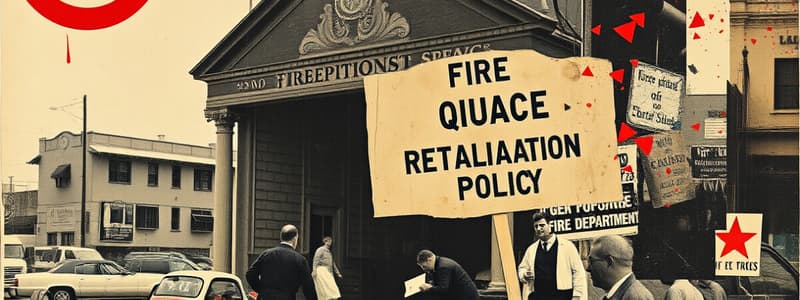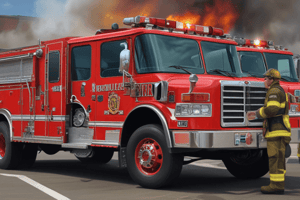Podcast
Questions and Answers
What is the main purpose of the Anti-Retaliation policy?
What is the main purpose of the Anti-Retaliation policy?
- To streamline fire response operations
- To prohibit retaliation against members who identify workplace issues (correct)
- To enhance public relations
- To manage financial records
Which of the following is NOT protected under the Anti-Retaliation policy?
Which of the following is NOT protected under the Anti-Retaliation policy?
- Reporting gross mismanagement
- Reporting fraud
- Reporting for nondiscriminatory reasons (correct)
- Reporting abuse of authority
What type of actions does the Anti-Retaliation policy prohibit?
What type of actions does the Anti-Retaliation policy prohibit?
- Actions taken for nondiscriminatory reasons
- Actions that are retaliatory in nature (correct)
- Actions taken for administrative purposes
- Actions taken for disciplinary reasons
What must members do before making a complaint under the Anti-Retaliation policy?
What must members do before making a complaint under the Anti-Retaliation policy?
Who can a member report to if they feel retaliated against?
Who can a member report to if they feel retaliated against?
What type of complaints are considered more effective according to the policy?
What type of complaints are considered more effective according to the policy?
What should supervisors do when they receive a complaint of retaliation?
What should supervisors do when they receive a complaint of retaliation?
What are supervisors NOT allowed to do under the Anti-Retaliation policy?
What are supervisors NOT allowed to do under the Anti-Retaliation policy?
Who is responsible for communicating the prohibition against retaliation to all members?
Who is responsible for communicating the prohibition against retaliation to all members?
What is considered retaliation under this policy?
What is considered retaliation under this policy?
Which of the following actions is NOT considered retaliation?
Which of the following actions is NOT considered retaliation?
What must be done with records of retaliation complaints and investigations?
What must be done with records of retaliation complaints and investigations?
How should supervisors handle requests for assignment or schedule changes due to retaliation?
How should supervisors handle requests for assignment or schedule changes due to retaliation?
Who should be notified of a complaint via the chain of command?
Who should be notified of a complaint via the chain of command?
What is expected from members making a complaint of retaliation?
What is expected from members making a complaint of retaliation?
What training should all members receive regarding this policy?
What training should all members receive regarding this policy?
Flashcards are hidden until you start studying
Study Notes
Anti-Retaliation Policy Overview
- The Anti-Retaliation policy is designed to prevent retaliation against members reporting workplace issues.
- Members are encouraged to act in good faith when reporting concerns, verifying facts before filing complaints.
Reporting and Complaints
- Protected actions include reporting fraud, abuse of authority, and gross mismanagement.
- Actions taken for nondiscriminatory reasons are not protected under this policy.
- Members can report acts of retaliation to any supervisor, command staff member, or the Fire Chief.
Handling Complaints
- Complaints are more effectively addressed when the identity of the reporting member is known.
- Supervisors must document complaints and actions taken to resolve them.
- Interference with a member’s right to complain is prohibited for supervisors.
Communication and Documentation
- The Fire Chief is responsible for communicating the anti-retaliation prohibition to all members.
- Records of retaliation complaints and investigations must be maintained according to established retention schedules.
- Notifications of complaints should follow the chain of command up to the Fire Chief.
Retaliation Actions and Protections
- Retaliation includes actions like refusing to hire or denying promotions, while denying promotions based on performance is not considered retaliation.
- State laws protect employees from retaliation for whistleblowing, especially against misuse of public funds and violations of laws.
- Notices about whistleblower protections must be posted conspicuously as required by law.
Supervisor Responsibilities
- Supervisors must receive and document complaints impartially and consider requests for assignment changes if they could mitigate further violations.
- Command staff should communicate the prohibition against retaliation upon receiving complaints.
- All members are required to receive periodic refresher training on the policy details to ensure compliance and understanding.
Studying That Suits You
Use AI to generate personalized quizzes and flashcards to suit your learning preferences.




